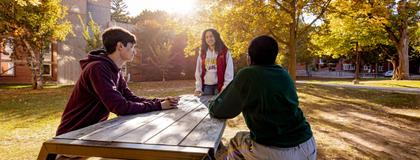
Forms, Policies and Conduct
Residence Community Living Standards
Community Standards ensure that our residence communities are safe, secure, and welcoming. The staff in this area is dedicated to making sure students feel heard and understand our conduct system, along with the Residence Community Living Standards (RCLS).
Purpose of the RCLS
The RCLS are part of your Residence Contract and aim to enhance your overall experience in residence. They help:
- Promote appropriate behaviors for a residence community
- Restore situations by repairing harm
- Rebuild trust and reconnect with your community
Your Responsibilities
As a resident, you are responsible for adhering to the behavioral standards outlined by Student Housing Services. Remember:
- The RCLS support your learning and personal wellness.
- Ignorance, anger, alcohol, or substance use will not be accepted as excuses for unacceptable behavior.
- The RCLS encourage you to take responsibility for your actions to ensure everyone in residence has a safe and enjoyable experience.
Restorative Approach
What is a restorative approach?
The idea of a restorative approach is to “make things right.” We all make mistakes, and sometimes people are harmed by our mistakes.
When that happens, our primary goal is to help you learn from your experiences, to see how your behaviour affected others, and to look for ways to resolve the problems. We’ll talk to you about what happened, how others might have been harmed, and how things can be made right so your relationship with the community can be rebuilt.
Although this is our primary goal, there are times when a restorative approach may be complimented with educational and developmental strategies such as attending an educational seminar or completing an online workshop. In some situations, a more punitive approach may also be used in accordance with campus procedures.
A circle is the name for one process that can be used when there is a community concern or to response to harm. The students who were harmed or affected by an incident (or ongoing behaviours) will gather with those who were responsible and the RLS facilitators. There will be a discussion to find a resolution that works for the entire group.
Research shows that these restorative practices work well in university residences; students learn from them and are much less likely to engage in negative behaviours again afterwards. The emphasis on restoring community relationships helps because students will need to go on living, working and studying in the community.
This approach also recognizes that starting at university can be a stressful and challenging time for many students, and gives more opportunities to learn.
Research shows that these restorative practices work well in university residences; students learn from them and are much less likely to engage in negative behaviours again afterwards. The emphasis on restoring community relationships helps because students will need to go on living, working and studying in the community.
This approach also recognizes that starting at university can be a stressful and challenging time for many students, and gives more opportunities to learn.
More information coming soon!
Policies and Procedures
Tobacco and Smoke-Free Campus Policy: As of May 31, 2019, the University of Guelph is a Tobacco and Smoke-Free Campus. Link here to the University of Guelph policy.
RCLS Appeals
If you have been found in violation of the Residence Community Living Standards (RCLS), and you disagree with this finding, you have the right to appeal.
Your appeal must be submitted within five (5) business days of receiving the decision letter through the Housing Portal.
Requirements: Appeals must include:
- An appeal statement.
- The original outcome letter/agreement.
Your appeal can be based on the following grounds:
- Procedural Fairness: A lack of procedural fairness impacted the outcome of the decision.
- Unreasonable Outcome: The outcome is unreasonable given the behavior involved.
- New Information: New information has come to light that was unavailable at the time of the original decision.
- Once submitted, the appeal will be reviewed by the Residence Behaviour and Wellness Manager.
- It may be forwarded to an Administrator for further review of the original decision.
- Alternatively, you can explore Alternative Dispute Resolution with the Residence Behaviour and Wellness Manager.
Please note, if you are appealing on-notice status as an outcome and have not met with your Residence Life Manager (in Training) or Residence Area Coordinator yet, please contact them to book a meeting to review the case. Their contact information can be found at the bottom of the letter you received. A formal appeal is only required if you are still not satisfied with the Manager/Coordinator’s decision after you have met with them.
For more information regarding the appeal process, please refer to the Frequently Asked Questions links below or contact the Residence Behaviour and Wellness Manager at rbwm@uoguelph.ca.
Appeal/Request to Review Form - under review
Forms & Conduct Links
If you have been assigned an outcome from a Community Assistant, or member of the Residence Life Management Team, the letter you were given should have the title of assignment(s) from the list below, including the due date to submit by. Please follow the link to see the details.
If you have questions or require an alternative format of any of the outcomes or forms below please contact the Community Standards Assistant, please connect with the Community Standards Assistant at communitystandards@uoguelph.ca.
Seminars: We also offer several seminars that focus on Alcohol, Cannabis, Decision Making, and Conflict. Each seminar is led by our Seminar Facilitator and are approximately 50 minutes in length. Seminars take place at a variety of times throughout each week. If you have been asked to sign up for a Seminar, please e-mail communitystandards@uoguelph.ca for more information.


